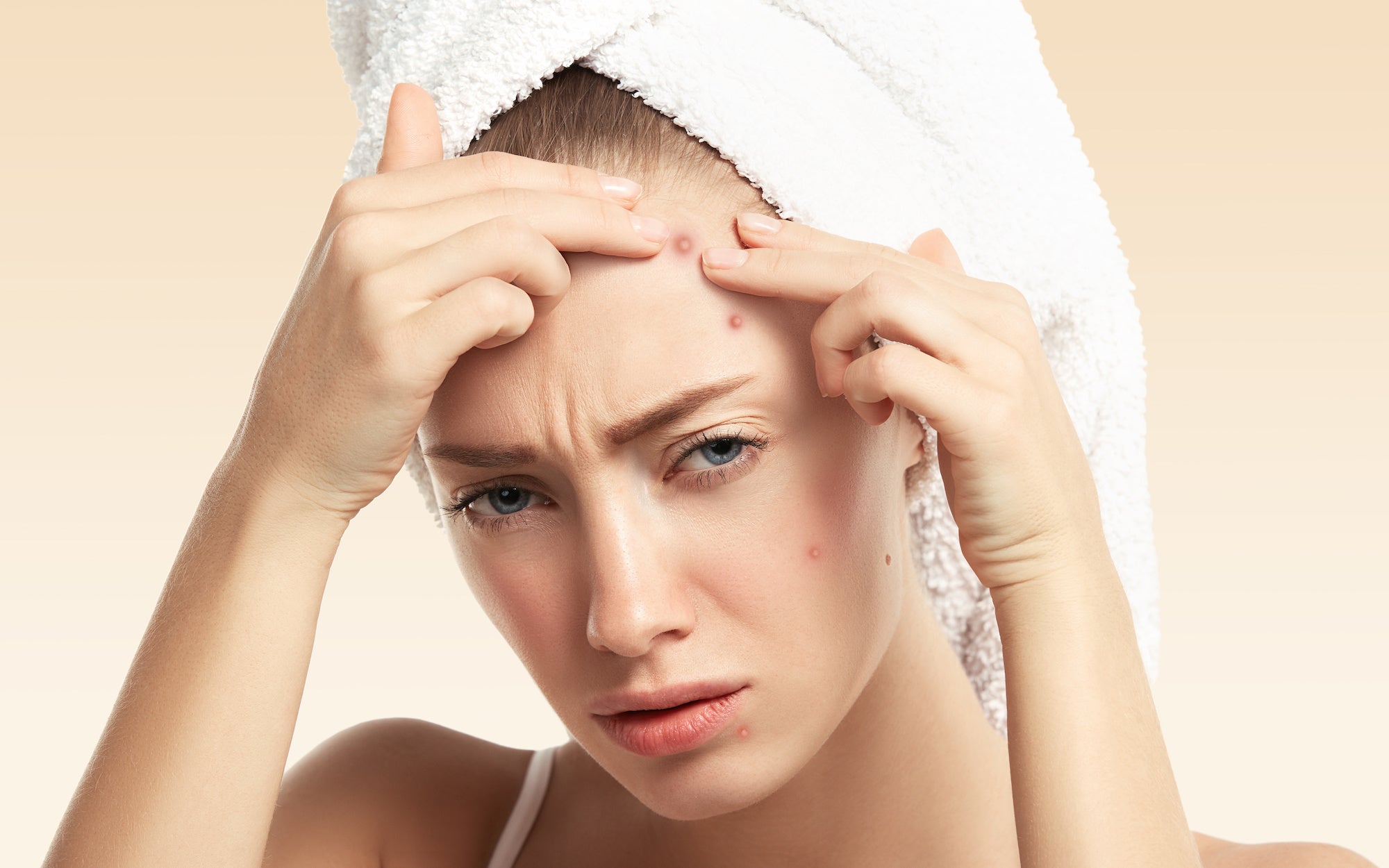
3 Common Pregnancy Skin Problems & How to Treat Them Safely
Pregnancy is a time of extreme change and transformation. A lot is going on inside the body to support new life, including a surge in hormones.
The sudden shift in estrogen and progesterone levels affect every woman's skin differently. For some, the surge in hormones shows up on their skin as acne or melasma, while others exude a beautiful pregnancy glow.
Pregnancy Acne
For me it has been a roller coaster of skin changes since conception. I am now 5 months pregnant, in my third trimester, and happy to report my skin has never looked better. The first trimester however was quite a different story. I was plagued with horrible acne that covered my face, neck, and chest. This sudden outburst of pimples caught me off guard and was hard to treat since a lot of my usual remedies are off limits for pregnant women.
Pregnancy acne is very common, especially in the first trimester when progesterone levels are beginning to rise, preparing the uterus to house a baby. Progesterone increases the amount of sebum produced by the skin, which in turn can lead to breakouts. When your skin produces too much oil, it can clog your pores with dead skin cells and promote acne causing bacteria.

Nava Greenfield, M.D. told Byrdie, "Cystic/hormonal acne and comedonal acne are two types that can typically occur during pregnancy."
Cystic acne is caused mostly by hormonal fluctuations and occurs when pores become blocked. This leads to inflammation and painful swollen red bumps. Pregnant women experiencing cystic acne usually breakout in the first and second trimesters.
Comedonal acne shows up on the skin like small flesh-colored acne papules. According to Healthline, blackheads and whiteheads are the most common forms of comedonal acne. Blackheads have “open” comedones, while whiteheads have “closed” ones.
Some Dos and Donts When Treating Pregnancy Acne
- Drink water. Drink plenty of water to flush toxins out of your body and to help balance your hormones.
- Wash your face am and pm. Adopt a consistent skincare routine at home that includes cleansing your face day and night and nourishing with pregnancy safe topicals.
- Keep your skin moisturized. Maintain skin hydration with Oxygenetix Hydro-Matrix to balance your skin's natural oils and keep it protected. The aloe vera base in Hydro-Matrix is antimicrobial, which combats acne causing bacteria all day.
- Choose safe, breathable makeup to apply such as Oxygenetix Oxygenating Foundation.
- Change your pillowcase and linens frequently to avoid transferring bacteria to other areas of your face.
- When in doubt, ask your dermatologist what is safe during pregnancy.
- Avoid Salicylic Acid or Retinol to treat pimples. Especially prescription retinoids such as Renova (tretinoin), Retin-A, Differin (adapelene), Tazorac, and Avage (tazorotene)Although there are no studies on pregnant women to prove the disruption in fetus development, research on rats has concluded them unsafe for pregnancy. Better to be safe than sorry.
- Avoid oral retinoids such as Isotretinoin or Accutane as they have been known to cause birth defects.
'Pregnancy Mask' or Melasma
The increase in hormonal activity can also cause women to develop melasma, commonly referred to as 'the mask of pregnancy'. Increased progesterone and estrogen levels stimulate excess melanin production. Dark brown spots and patches then form on the forehead, upper lip and cheeks.
More melanin in the skin can also darken freckles, moles and your areolas. Many women develop the linea nigra, a dark line down the center of the abdomen.
Melasma worsens the more you are exposed to sunlight, so sun protection is crucial.
Skin discoloration during pregnancy can begin to fade once baby is born and done breastfeeding, but it may linger.
Some Dos and Donts When Treating Pregnancy Mask
- Use gentle skin brighteners that are safe for pregnancy such as Vitamin C and E each day.
- Wear a broad spectrum sunscreen of at least SPF 30 each day, no matter the weather.
- Protect your skin with Oxygenetix Oxygenating Foundation. With a wide range of skincare benefits and a gentle pregnancy safe formula, Oxygenating Foundation will keep you covered while promoting cellular growth.
- Avoid strong chemical peels or bleaching skin lighteners that can penetrate the skin.
- Wait until after pregnancy to get microneedling, laser procedures or other forms of cosmetic treatments that work deep into the skin.

Increased Skin Sensitivity
Many women experience a heightened awareness of smells and flavors during pregnancy. This increased sensitivity often translates to the skin as well. Certain products that once were tolerated may now cause irritation.
You can also get itchy dry skin, especially as your skin stretches for baby. Drinking plenty of water and using moisturizers that protect your lipid barrier will help tremendously.
If you have any rashes or severely itchy skin, it's best to get checked by your OB/GYN as it may be due to infection or an autoimmune condition.
If you have increased skin sensitivity:
- Use products that are hypoallergenic, fragrance-free, and non-comedogenic.
- Moisturize your skin daily with Oxygenetix Hydro-Matrix to maintain optimal moisture levels and protect your skin's natural barrier.
- Get plenty of beauty sleep.
Being pregnant is an exciting time that comes with a lot of transformation. Remember to love your body through it as it works hard supporting your little one.



Leave a comment
This site is protected by hCaptcha and the hCaptcha Privacy Policy and Terms of Service apply.